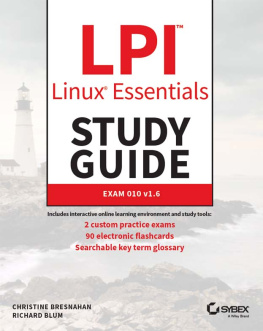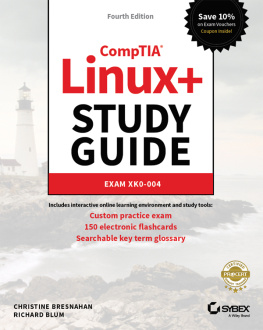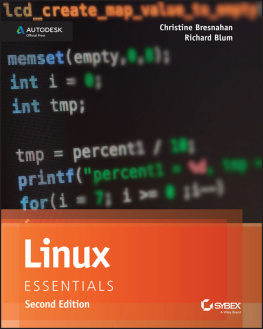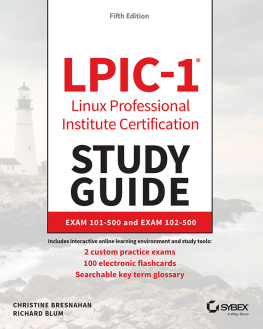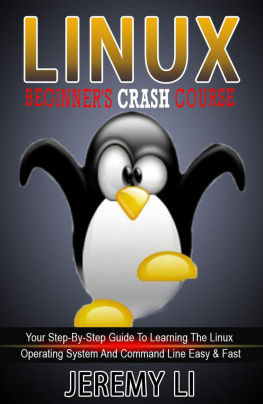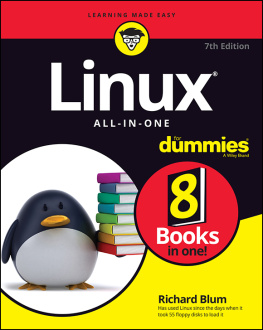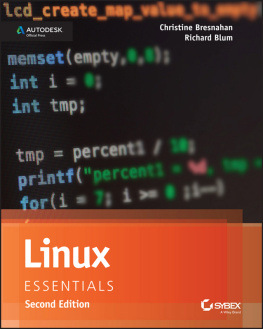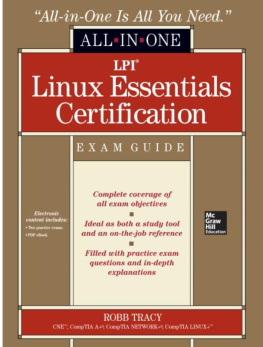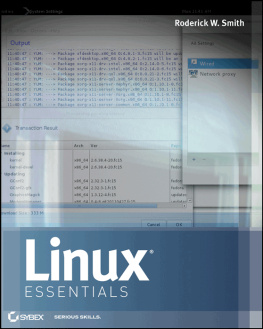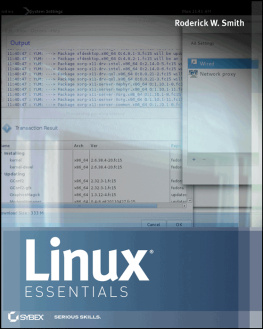
LPI
Linux Essentials
Study Guide
Third Edition

Christine Bresnahan
Richard Blum
Copyright 2020 by John Wiley & Sons, Inc., Indianapolis, Indiana
Published simultaneously in Canada
ISBN: 978-1-119-65769-9
ISBN: 978-1-119-65770-5 (ebk.)
ISBN: 978-1-119-65771-2 (ebk.)
Manufactured in the United States of America
No part of this publication may be reproduced, stored in a retrieval system or transmitted in any form or by any means, electronic, mechanical, photocopying, recording, scanning or otherwise, except as permitted under Sections 107 or 108 of the 1976 United States Copyright Act, without either the prior written permission of the Publisher, or authorization through payment of the appropriate per-copy fee to the Copyright Clearance Center, 222 Rosewood Drive, Danvers, MA 01923, (978) 750-8400, fax (978) 646-8600. Requests to the Publisher for permission should be addressed to the Permissions Department, John Wiley & Sons, Inc., 111 River Street, Hoboken, NJ 07030, (201) 748-6011, fax (201) 748-6008, or online at http://www.wiley.com/go/permissions.
Limit of Liability/Disclaimer of Warranty: The publisher and the author make no representations or warranties with respect to the accuracy or completeness of the contents of this work and specifically disclaim all warranties, including without limitation warranties of fitness for a particular purpose. No warranty may be created or extended by sales or promotional materials. The advice and strategies contained herein may not be suitable for every situation. This work is sold with the understanding that the publisher is not engaged in rendering legal, accounting, or other professional services. If professional assistance is required, the services of a competent professional person should be sought. Neither the publisher nor the author shall be liable for damages arising herefrom. The fact that an organization or Web site is referred to in this work as a citation and/or a potential source of further information does not mean that the author or the publisher endorses the information the organization or Web site may provide or recommendations it may make. Further, readers should be aware that Internet Web sites listed in this work may have changed or disappeared between when this work was written and when it is read.
For general information on our other products and services or to obtain technical support, please contact our Customer Care Department within the U.S. at (877) 762-2974, outside the U.S. at (317) 572-3993 or fax (317) 572-4002.
Wiley publishes in a variety of print and electronic formats and by print-on-demand. Some material included with standard print versions of this book may not be included in e-books or in print-on-demand. If this book refers to media such as a CD or DVD that is not included in the version you purchased, you may download this material at http://booksupport.wiley.com. For more information about Wiley products, visit www.wiley.com.
Library of Congress Control Number: 2019955498
TRADEMARKS: Wiley, the Wiley logo, and the Sybex logo are trademarks or registered trademarks of John Wiley & Sons, Inc. and/or its affiliates, in the United States and other countries, and may not be used without written permission. Linux is a registered trademark of Linus Torvalds. All other trademarks are the property of their respective owners. John Wiley & Sons, Inc. is not associated with any product or vendor mentioned in this book.
Dedicated to the loving memory of Kevin E. Ryan, our longtime technical editor and friend. Kevin's gentle correction and guidance helped make our work better. His contributions will be missed.
As iron sharpens iron, so one man sharpens another. Proverbs 27:17 (NIV)
Acknowledgments
First, all glory and praise go to God, who through His Son, Jesus Christ, makes all things possible, and gives us the gift of eternal life.
Many thanks go to the fantastic team of people at Sybex for their outstanding work on this project. Thanks to Devon Lewis, the acquisitions editor, for offering us the opportunity to work on this book. Also thanks to Stephanie Barton, the development editor, for keeping things on track and making the book more presentable. Thanks, Steph, for all your hard work and diligence. The technical editor, Jason Eckert, did a wonderful job of double-checking all the work in the book in addition to making suggestions to improve the content. We would also like to thank Carole Jelen at Waterside Productions, Inc., for arranging this opportunity for us and for helping us out in our writing careers.
Christine would particularly like to thank her husband, Timothy, for his encouragement, patience, and willingness to listen, even when he has no idea what she is talking about.
Rich would particularly like to thank his wife, Barbara, for enduring his grouchy attitude during this project and helping to keep up his spirits with baked goods.
About the Authors
Christine Bresnahan started working with computers more than 30 years ago in the IT industry as a systems administrator. Christine is an adjunct professor at Ivy Tech Community College, where she teaches Linux certification and Python programming classes. She also writes books and produces instructional resources for the classroom.
Richard Blum has also worked in the IT industry for more than 30 years as both a system and network administrator, and he has published numerous Linux and open source books. Rich is an online instructor for Linux and web programming courses that are used by colleges and universities across the United States. When he is not being a computer nerd, Rich enjoys spending time with his wife, Barbara, and his two daughters, Katie and Jessica.
Introduction
This book you hold in your hands provides a solid introduction to the Linux operating system. As its title suggests, it will give you the essential knowledge to begin using and managing this powerful operating system (OS), which is an important one in todays computing world.
The Linux Professional Institute, or LPI (lpi.org), offers a series of Linux certifications. These certifications aim to provide proof of skill levels for employers; if youve passed a particular certification, you should be competent to perform certain tasks on Linux computers. The LPI exams include Linux Essentials, LPIC-1, LPIC-2, and the LPIC-3 series. As the name implies, the Linux Essentials exam is the lowest level of the four exams, covering the most basic tasks of using and administering a Linux computer.
The purpose of this book is to help you pass the Linux Essentials exam, updated in 2019 to version 1.6. The Linux Essentials exam is meant to certify that you:
- Understand the open source industry
- Have knowledge of the most popular open source applications
- Understand the major components of Linux
- Can work at the Linux command line
- Have basic knowledge of security and administration-related concepts
- Know where to go for help
Why Become Linux Certified?
With the growing popularity of Linux (and the increase in Linux-related jobs) comes hype. With all the hype that surrounds Linux its become hard for employers to distinguish between employees who are competent Linux users and those who just know the buzzwords. This is where the Linux Essentials certification comes in.
Next page
